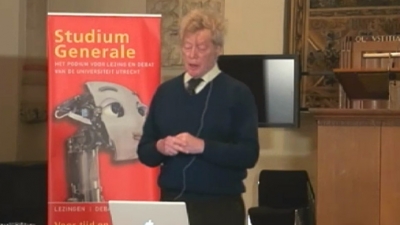Speak up for ideals
Prof. Roger Scruton argued this in the third and final lecture in the series Speak up for ideals .
Equality as a virtue
According to Scruton we have a desire for equality because it makes us feel safe. We may have nothing to aspire to, but neither do others. Instead of seeing the success of someone as a merit on its own, we interpret it as a failure of our own achievements. That is why we force a smile, rather than be genuinely pleased for the other person. Scruton maintains that the motive for equality can be found in the works of Friedrich Nietzsche (1844-1900): the unsuccessful make equality into a virtue to seize and redistribute some of the assets of the successful. This is of course a dangerous position but, whatever the motive, there seems to be a tension between equality and success.
Fake culture
Not only economic success is seized: recently there has been a destruction of high culture which has led to mediocrity and phoniness. Scruton points to the huge amount of 'fake' music, television and art that is mass produced and which is based on imitation. This is a result of the tendency to see aesthetic judgement as something suspicious. We are not allowed to judge something a truly beautiful because that would go against the principle of equality: true beauty is not exclusively for the elitist. So we revert to kitsch which, according to Scruton, is a fungus growing on our culture, that should be scraped off
A noble lie
Although the majority sees equality as a virtue, most people want to excel. Parents, maintaining the virtue of equality in general, want their children to be outstanding. There is hope of their children becoming better than others. This leads to politicians who secretly educate their children at state schools while, at the same time, campaigning against these schools. Perhaps we just need to accept inequality and create a space in which people can be part of an elite. This might be hard to sell, but it might also be the only way to preserve the 'genuine', high culture that we have inherited. Scruton even suggest concealing the conservation of high culture by what Plato called a 'noble lie': a lie told by the elite to protect beautiful things that might otherwise be neglected. This might be taking it a bit too far, especially in a society that highly values transparency and democracy. But it does reveal an underlying problem: minorities always have to battle against majorities. This is no less true of high culture that is nowadays seen as superfluous and pompous.
How to protect it? That is a difficult question. We could revert to a noble lie or, perhaps more likely to succeed, create appreciation for the cultural heritage that we possess. Students should, rather than showing their drinking skills, focus on showing what makes the university an exceptional place. There should be more emphasis on traditions such as ceremonies and processions. Only then there will once again be civic pride for institutions that are not accessible to all.




